This column isn't going to earn anyone money—to the contrary—many of you will likely hate us for writing it. But the truth is the truth. The purpose is not to "create division" or call out other conservative "influencers" simply because we have differing opinions. We have all spent years watching blatant government corruption, constitutional rights being trampled, and elections stolen—all with no one being held accountable.
"This is over. We want every damn bit of evidence that every intelligence agency has. Or it's maybe time to shut those agencies down. Because, at the end of the day, our liberties are more important than anything else we have in this country. And they have been stampeded over by these dirty cops and the Democratic party and the media who fails to report on it." ~ Congressman Devin Nunes on Sunday Morning Futures with Maria Bartiromo in October 2020
Understandably, there are many who are frightened, confused, and feeling desperate after witnessing all of this. They are hoping for a "hail mary" to come flying in that will restore the country to the constitutional republic—with equal justice under the law—that she was meant to be. And in their desperation, they are prone to cling to whatever appears promising that'll make it happen.
Sadly, there are people out there who will exploit, profit from, or simply "grift" off that desperation by filling the need with false hope—or "hopium." It appears, unfortunately, that Brunson v. Alma S. Adams; et al. (No. 22-380)—also known as "The Brunson Case"—pending before the U.S. Supreme Court (SCOTUS), is just such an example.
Where the Case Really Stands
First, we need to dispel some misunderstandings about the status of the case. It is not "scheduled for a hearing" before SCOTUS. So far, it is simply a petition for a writ of certiorari that's been scheduled for conference. All that requires is filling out an online application and paying a filing fee.
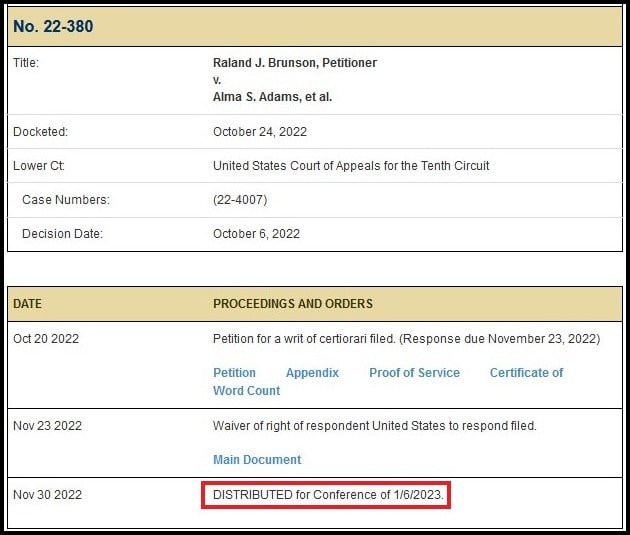
Constitutional attorney Robert Barnes—a member of the Supreme Court Bar who has filed countless petitions for cert and made oral arguments in front of SCOTUS a number of times—explained the process for filing a petition for a writ of certiorari and how the petition is considered by the SCOTUS justices and their clerks on a recent Livestream with Viva Frei.
A "conference" is where the SCOTUS justices meet and vote on cases they will "grant cert"—with four needing to vote "Yes" to accept the case and schedule for oral arguments. Here's the Order List that came out of a recent conference. The justices considered 158 petitions for cert. They denied 157 and took 1. And for a couple of the denials, they told the Clerk of the Court (effectively), "Tell this idiot to stop bothering us with this nonsense. Don't accept any more petitions from this guy."
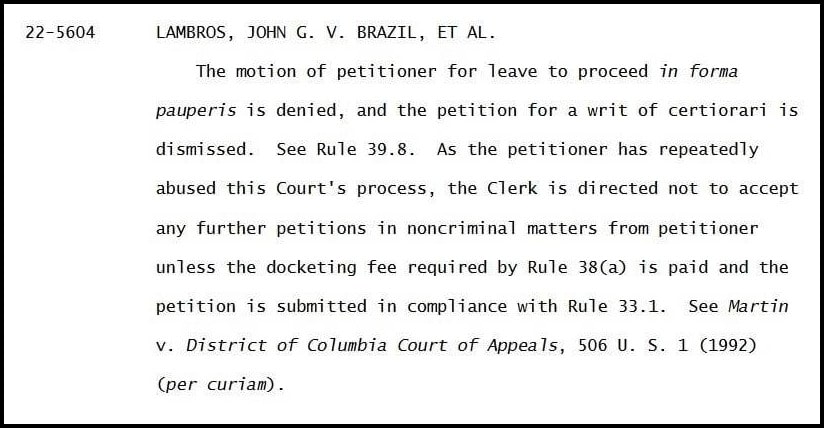
As Barnes noted above, every justice claims they read every single petition for cert filed with the court, but that claim is very much in doubt. SCOTUS justices employ clerks who read and vet all the petitions ahead of time. The clerks are very familiar with the judicial philosophy of the justice they work for and what legal arguments they would be interested in discussing. It is believed—based on what court insiders have described about the inner workings of the court—only the ones with merit are ever passed along and briefed by the clerks to the justices themselves. Justices simply don't have time to read each and every one of the thousands of petitions that get filed with the SCOTUS every year.
Further, as independent journalist and podcaster Just Human noted on Truth Social, "only 20-25% of the petitions distributed for a given conference are actually discussed".
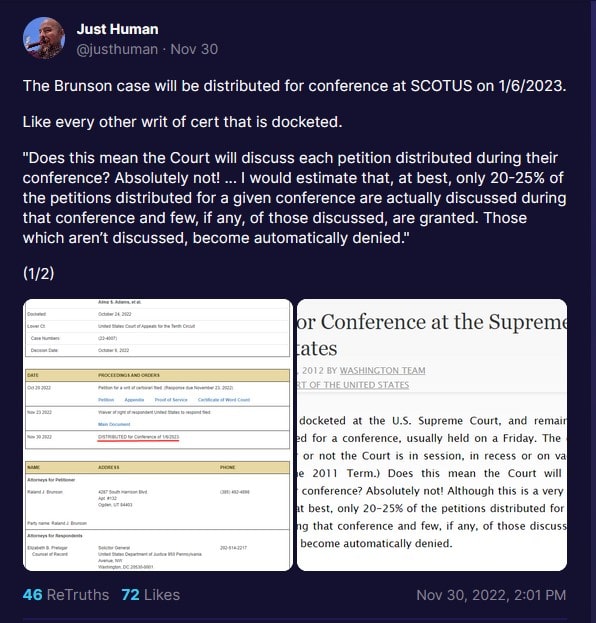
The other 75-80% of petitions are denied and discarded—likely without the justices ever reading them or even being aware they exist.
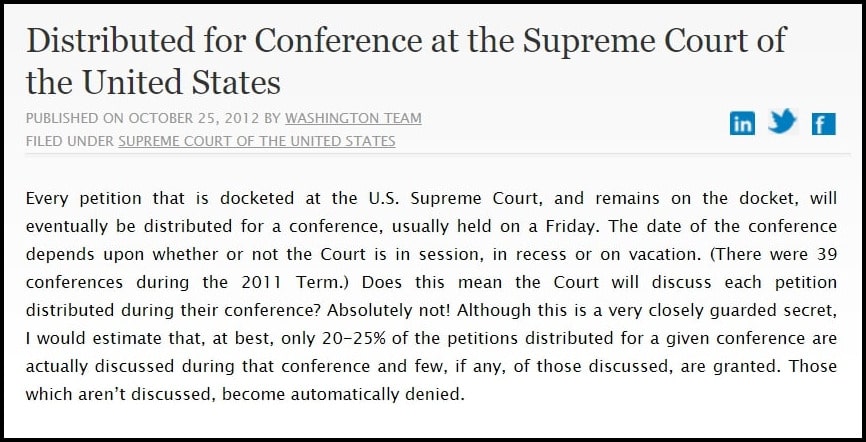
Screenshot from 'Counsel Press' article cited by Just Human from his research.
A lot has been made out of the Brunson brothers' interaction with the Clerk of the SCOTUS after they initially filed their petition for cert. As detailed on the Brunson's website:
"The Clerk of the SCOTUS calls Raland again. She asks, "How are you doing on your revision of the Writ with the additional information that we need?" Raland said, "We're working on it as we speak!" She said, "How soon can we get it?" Raland said, "Right away!"
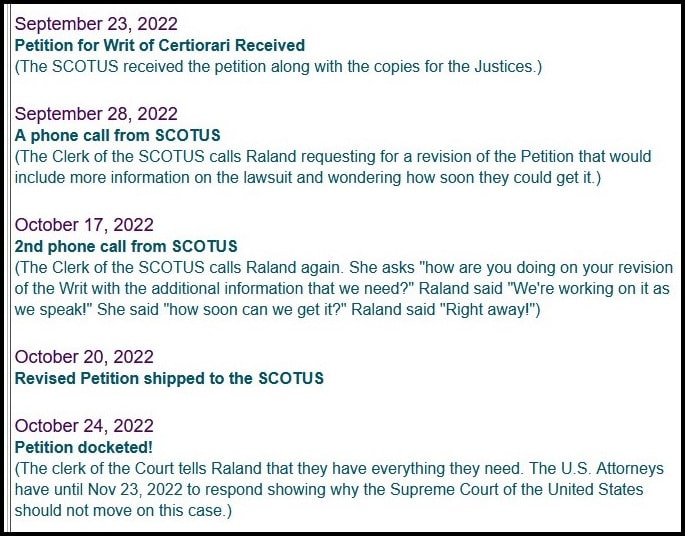
Some have interpreted this to mean the justices are eager to hear this case and proactively reaching out through the clerk to get it in front of them as quickly as possible. In our opinion—given how we know how the court operates—that interpretation makes little sense.
First, as anyone who has watched a senate confirmation—since the Robert Bork nomination hearings—understands, justices and SCOTUS nominees go out of their way not to appear to "prejudge" cases. Justices do not—at least publicly—proactively reach out to potential litigants seeking cases be brought they wish to consider. And they certainly aren't going to make a public record of it by reaching out through the Clerk of the Court.
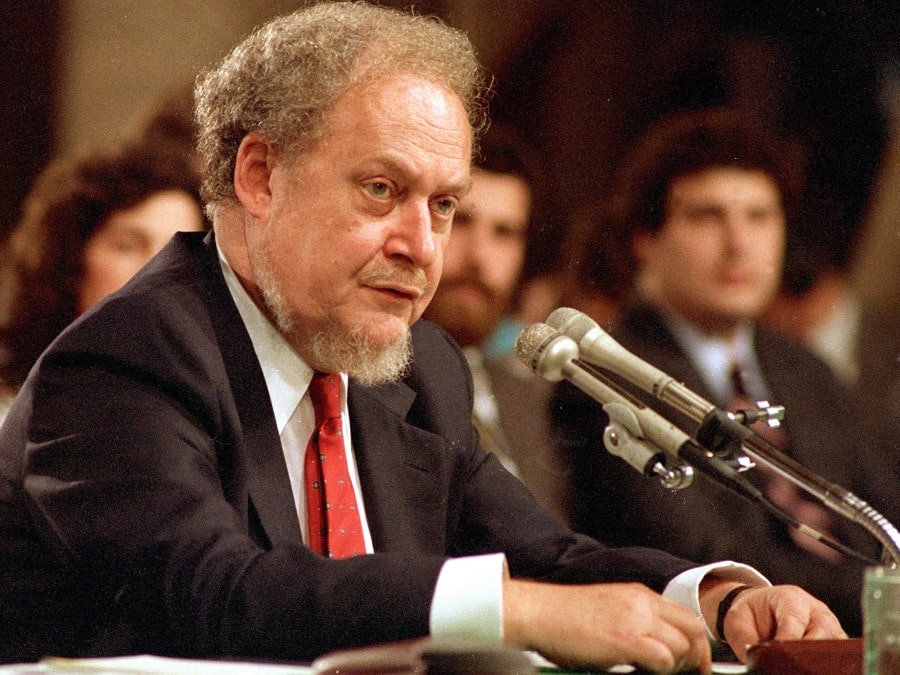
Robert Bork, seen at his 1987 SCOTUS nomination hearing before the U.S. Senate, where his confirmation was later denied
In the event justices do wish to have a matter brought before them they believe needs to be addressed, they do so by publicly signaling it in their written opinions (majority, concurrence, and/or dissenting)—as Justice Clarence Thomas recently did in a concurring statement related to Section 230; ironically as part of a denial for a petition for writ of certiorari.
Second, as Barnes talked about in the same recent Livestream (and coincidentally cites our own Tracy Beanz), the people behind the Brunson petition have misinterpreted the actions of the clerk. Barnes explains SCOTUS is "the best court in America" when it comes to assisting pro se litigants—i.e., individuals who represent themselves in court rather than through an attorney, translated from Latin as "advocating on one's own behalf"—in filing petitions. So the proactive actions by the clerk, in this case, are simply in keeping with the court's usual interactions with nearly all pro se litigants. SCOTUS has not done anything out of the norm with this case. It's just being marketed better.
"The Supreme Court, to its credit, is very generous with its time about helping people file a petition in the right way. File it at the right time. File it in the right format. Particularly pro se litigants like this. They are the best court in America, by a long mile, at helping the little guy properly get his petition before the U.S. Supreme Court. Great credit to the Supreme Court and its personnel on that side of the aisle." ~ Constitutional attorney Robert Barnes
Barnes dispels another myth about the Brunson petition in the same clip above. As noted on both the SCOTUS docket and Brunson website, the Dept. of Justice (DOJ) waived its right to respond to the petition at all.

Somehow, this is being spun by proponents as a good sign for the petition. The lawsuit is so solid that DOJ is simply unable to mount any kind of defense against it. Does that actually make sense to anyone? The highly-politicized Merrick Garland DOJ is just going to throw up its hands and allow SCOTUS to unilaterally remove the entire Democratic party power base from elected federal office without so much as making an argument? And do so in a case that has been dismissed with ease at every level below SCOTUS? Does that really make sense to anyone?!? It's absurd, almost beyond the point of comprehension. It's nonsense.
As also noted by Barnes, the only reason that would happen is because the DOJ does not even feel the need to respond because the lawsuit has no merit whatsoever. If the court thought there was any chance—any chance at all—that the justices would vote to hear the case, they would reach out and request a response from the DOJ. The fact that neither the DOJ nor the court thought a response was necessary is the clearest sign that this case is going nowhere.
Merits Of The Case
We have read the lawsuit filed by the Brunson brothers. In our honest opinion, it does not seem to have any basis in constitutional law. Frankly speaking—as found by the 10th Circuit Court of Appeals in their dismissal—it's "frivolous."

The truth is, the only reason this case got to the stage of a petition for a writ of cert with SCOTUS this quickly is because it completely lacks merit. You only need to think back to your 4th-grade civics class to understand why it lacks merit.
Now we will be the first to admit our constitutional processes are not functioning as our founders intended. We are only speaking to how the system was designed to function.
Under our system of separation of powers and "checks and balances," the Legislative Branch (Congress) is the only one with the power to remove sitting members of the other two branches—or sitting members of Congress itself. The Founders entrusted this power solely to Congress because it is the political branch and most accountable to the people. In theory, if Congress were to abuse its authority—and remove a member of the other two branches against the will of the people—those members could be voted out of office in short order. Hence, the people would have the remedy to correct the imbalance and hold the ultimate check on power.
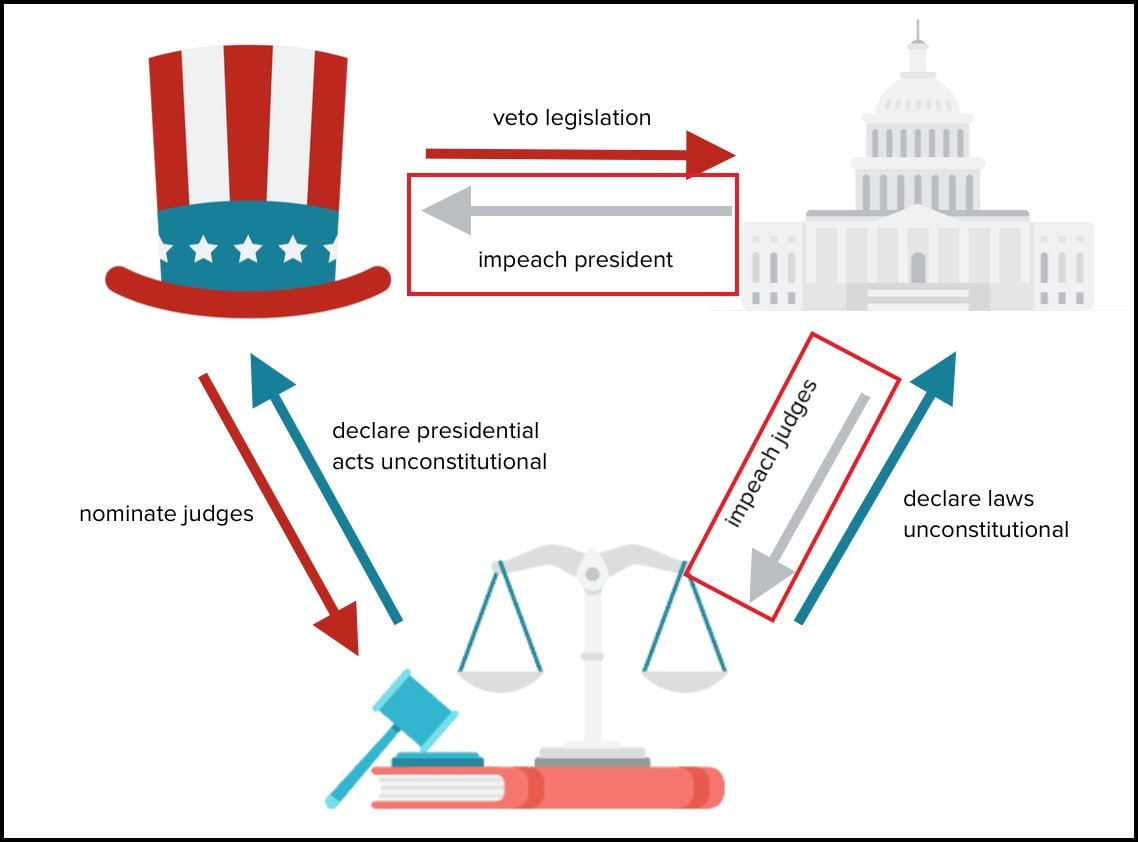
For that reason alone, this case is dead on arrival at SCOTUS. Even if the case had merit on all the other issues presented in the lawsuit, SCOTUS does not have the power to grant the remedy being sought. Therefore there is nothing for the justices to rule on; they can't do anything about it. And if you really think it through, there's a very good reason for that.
Tracy Beanz explained—in a recent voice memo thread on Telegram—what the ramifications would be if SCOTUS actually did have this power. In a hypothetical scenario she gives (at the 7:30 min mark)—if President Trump were to be re-elected in 2024—what would there be to stop the Left from filing a sternly worded brief with SCOTUS and having him removed from office soon after the 2025 inauguration? After witnessing how Article III and state courts have ruled—nearly across the board in election cases involving President Trump or America First Republicans—would you really trust them not to do so? What would be the constitutional remedy to stop it?
"You don't want the SCOTUS to have the power to remove sitting elected officials." ~ Tracy Beanz on Telegram
Congress Always has the Final Say
One thing that needs to be understood, under our constitutional system, Congress always has the final say in who is or is not the President. Whether that means certification of the presidential election, removal by impeachment, or removal via the 25th Amendment—Congress always has the last word; by design.
The case often cited to refute this point is the landmark SCOTUS decision Bush v. Gore that resolved the disputed 2000 presidential election. While it is true the decision cleared the way for Governor George W. Bush (R-TX) to be declared the eventual winner, Congress still had to effectively sign off on the SCOTUS decision by its certification of the presidential electoral count. Had they chosen to do so—as the Democrats attempted—Congress still had the constitutional authority to set aside the electors from the state of Florida and vote to certify the 2000 election for Vice President Al Gore (D-TN) instead, putting him in the White House. And SCOTUS couldn't have done anything to overrule them.
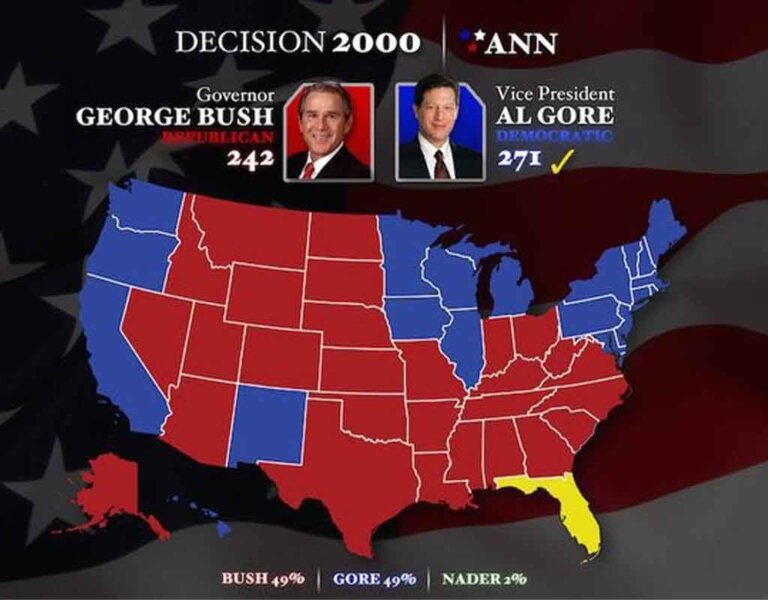
In the aftermath of the 2020 election—despite "losing" 60+ election contest cases brought by President Trump or on his behalf—Congress again had the constitutional authority to ignore court rulings and certify Trump as the winner.
The reason the Jan 6th, 2021 Fedsurrection was necessary is simple. The American public was never presented with the actual evidence of the 2020 Election "Fortification." The "cabal" could not risk members of Congress changing their minds at the last minute—due to political pressure from constituents outraged after hearing all the evidence—and refusing to certify electors from at least three of the contested states. Had that happened, the election would have been declared contested, and the House of Representatives voted by state delegation (50 votes total) to determine the winner. Republicans—holding the majority of state delegations—presumably would have declared President Trump the winner.
It was a risk they couldn't take. Thanks to the Jan 6th Capitol Hill Riot, all presentations of the evidence ceased, and the leadership was able to rush the congressional certification through. The person most harmed politically by the events of Jan 6th was President Trump himself, and it's the clearest indication that he had nothing to do with it.

(Left) The Reichstag Fire event that allowed the Nazi Party to seize total control of Germany in 1933, and (Right) the Capitol Hill Riot event of Jan 6th, 2021
The Constitutional Convention of 1787 & Electors Clause
This, however, further undermines the merits of the Brunson petition. The notion the Founders never anticipated malfeasance or foreign interference to occur in a presidential election is simply not true. In fact, they expected it. Article II Section I—known as the "Electors Clause"*—of the U.S. Constitution was the most hotly contested debate during the Constitutional Convention of 1787.

Portrait of the Constitutional Convention of 1787
The Emoluments Clause was added out of fear that European monarchies would simply bribe U.S. government officials with titles of nobility and seize control of the newly founded country that way.
The requirement that the President be a U.S. natural-born citizen was included, in part, to prevent a European royal from sending over a prince—or the like—to get elected and then have the chief executive beholden to a foreign ruler.
For various reasons, fewer than forty-four thousand popular votes were to be cast—in total—during the first-ever Presidential Election of 1788-89. So the eligible voting population was not very large at all, and relatively few fraudulent votes could easily tip the scales one way or another.
All of these scenarios were considered possible and likely at the time of the constitutional ratification.
So to believe the Founders did not anticipate these types of events—and address them within the text of the Constitution—is simply wrong. Anyone arguing we are in "unprecedented times" or "extra-constitutional remedies are required" doesn't understand the design of the system; or our history.
Here you had thirteen staunchly independent, former colonies who had just found a war of independence to free themselves from a tyrannical foreign ruler. Out of that fear, the original Articles of Confederation did not even provide for a true chief executive to administer the federal government.

They were now coming together to agree on a process to elect one chief executive with authority over all of them. With the divides already forming between North & South, free states & slave states, industrial & agricultural—they knew electing a unanimous candidate to fill the position was next to impossible.
For those reasons, they had to develop a process with robust opportunities to contest. The outcome had to provide as much assurance—to as many as possible—that the will of the people had been carried out. But it also needed to provide for finality.
The Founders realized these elections would be fiercely contested, and the elected chief executive could not be subject to removal at any moment for the entire four-year term. The co-equal executive branch would be unable to function effectively with election contest issues hanging over it. The constitutional system wouldn't survive. Hence, the reasons for the complexity of the Electors Clause.
Past Examples & Cases
Both John Adams and Thomas Jefferson—in their capacities as Vice presidents—presided over highly controversial congressional certifications that resulted in themselves being named President. The legality of their actions is still being debated to this day by constitutional scholars. Yet despite this, there was never any possibility the Supreme Courts of the time had the power to retroactively review their actions and remove them from the presidency once sworn into office. SCOTUS simply does not have the power to do it.

(Left) Thomas Jefferson - the 3rd President of the United States, and (Right) John Adams - the 2nd President of the United States
But let's imagine for a second that SCOTUS did. Do you see the problem that would create? The SCOTUS would have had extraordinary leverage over Adams & Jefferson, knowing they could simply take up the case and remove them at any point. Both Founding Fathers would have been completely neutered and unable to challenge SCOTUS on any hot-button issue of the day—an untenable circumstance between two co-equal branches of government meant to be in conflict by design.
Trump election attorney Jenna Ellis concisely explained the process during an interview with Sebastian Gorka (starting at about 4:05 min). The interview took place during the last uproar over a supposed upcoming "hail mary" case. This was back when the likes of—disgraced Pulitzer Prize-winning Pee Tape Truther—Maggie Haberman pushed the fake news story that Trump believed SCOTUS intended to reinstate him as President in August 2021.
One of the popular theories batted around is that SCOTUS "took the case" (which, again, is false ... SCOTUS has not "taken" the case) to hold over the heads of members of Congress during the current lame-duck session. That is precisely why SCOTUS does not have the power to remove members of Congress or any other sitting elected official. It would mean they were beholden to SCOTUS on any decision they make or risk losing their elected office by stepping out of line.
If SCOTUS did have that power, then we don't live in a constitutional, representative republic. We are governed by an all-powerful ruling counsel of five unelected government officials—with lifetime appointments—who are accountable to no one.
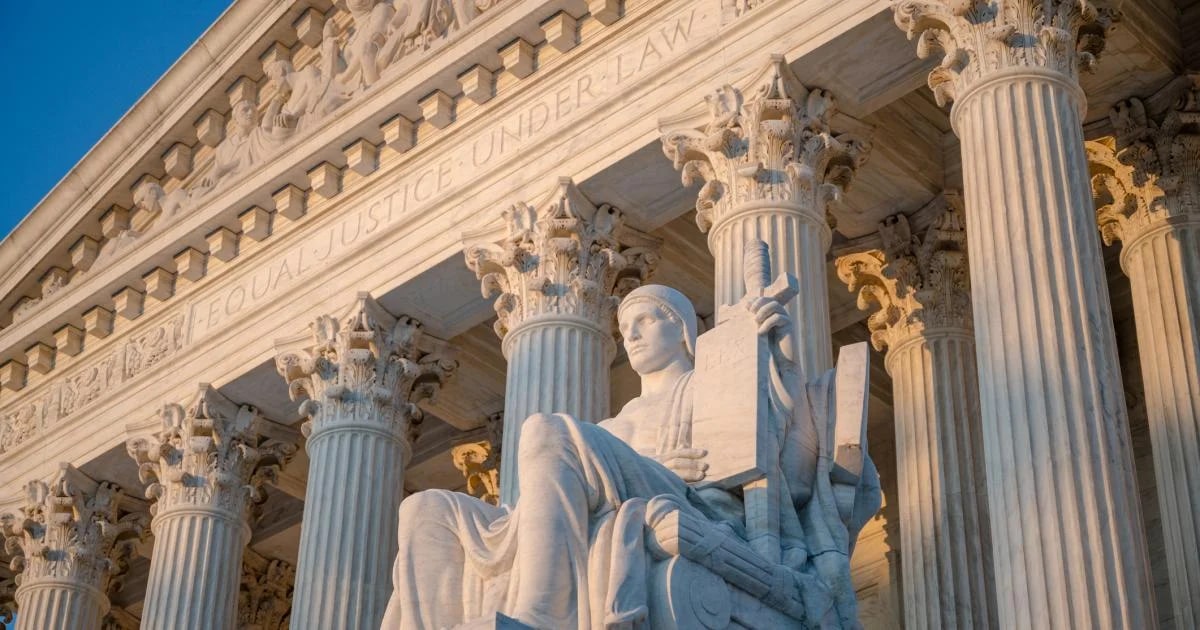
2018 North Carolina 9th Congressional District Election
One case often held up as an example of when courts removed a member of Congress is the 2018 North Carolina 9th congressional district election. There are several myths about this election contest that needs to be dispelled. First, the election was never overturned by any court. The decision was made by the North Carolina State Board of Elections (NCSBE)—a creation of the North Carolina state legislature and administered by the state's executive branch. So the judiciary is not involved in any manner. Second, Mark Harris (R)—initially declared the winner but whose victory was later overturned—never had his election certified and was never seated in Congress. Had Harris been certified or seated, any effort to overturn the election result and remove him would have fallen to the U.S. House of Representatives. The courts did not have the final say in the outcome.
"Fraud Vitiates Everything"
Another phrase that gets thrown around a lot—and cited explicitly in the Brunson petition—is "fraud vitiates [makes void] everything into which it enters." This is a legal doctrine established in U.S. contract law. It was first established in the case of United States v. Throckmorton and later expounded on in cases like Veterans Service Club v. Sweeney and Radioshack Corp. v. ComSmart. These cases set legal precedents that any contract entered into by fraudulent means invalidates the entire arrangement, and everything goes back to the beginning.
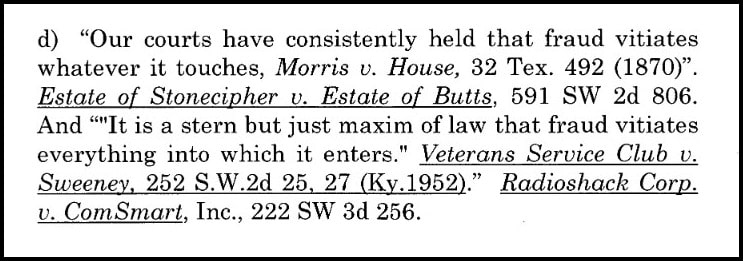
Screenshot from the Brunson v. Alma S. Adams; et al. petition for writ of certiorari pending before SCOTUS
While this type of legalese might sound pretty convincing to an untrained ear, legal precedents in contract law do not trump constitutional powers. Suppose someone is telling you the legal opinions in U.S. v. Throckmorton. In that case, VSC v. Sweeney or Radioshack v. ComSmart supersede a plain reading of processes spelled out in the first three articles of the U.S. Constitution; they're kidding themselves ... or they've got something to sell you.
Texas v. Pennsylvania
This is not to say The Founders intended the judicial branch to have no role in the election contest process. It is spelled out right in the Constitution—Article III Section 2 Clause 2. If SCOTUS intended to intervene in the 2020 election ahead of the Electoral College Count and Congressional Certification, they had their chance.
Anytime a state sues another state, SCOTUS has Original Jurisdiction over the case. This means they are literally the only court in the land than can hear the case. The overall theory behind the doctrine is any case brought in a district or circuit containing one of the litigants would give that state a "home field advantage" and likely result in an unjust outcome.
This was also explicitly done with presidential elections in mind. As mentioned, thirteen independent states—with little trust in one another—entered into an arrangement to select a single chief executive with authority over all of them. Should one of those states choose electors in a manner that violated the terms of the Constitution, The Founders put in a mechanism whereby it could be challenged straight to the SCOTUS level ahead of the Electoral College Count. Thereby including the judicial branch and adding another layer for robust challenges.
Just such an election case was brought in 2020—Texas v. Pennsylvania. Texas Attorney General Ken Paxton originally filed the lawsuit with the help of drafting by current Kari Lake lead election counsel Kurt Oslen. The suit was initially filed against four other states—Pennsylvania, Georgia, Michigan, & Wisconsin—alleging election officials in those states had bypassed laws established by their respective state legislatures as required by the Electors Clause and certified electors unconstitutionally.

Nearly 20 states and state attorney generals joined with Texas in the lawsuit by filing amici briefs along with President Trump, over 100 members of Congress, and countless other federal & state officials—with 20 other states filing amici briefs on the side of the four defendant states (over 40 states total in the suit). Given that no other court could hear the case—and there was nowhere else to appeal—SCOTUS had the authority and the constitutional obligation to give the lawsuit an evidentiary hearing as intended by the framers.
Despite this, SCOTUS denied the petition for a writ of certiorari by a 6-3 vote for "lack of standing." A legal doctrine that didn't even exist in the first 150 years of American case law and was never contemplated by The Founders in the Constitution, Constitutional Convention, Federalist Papers, or anywhere else. In our opinion, it represents one of the worst acts (or inactions) in the history of the Supreme Court.
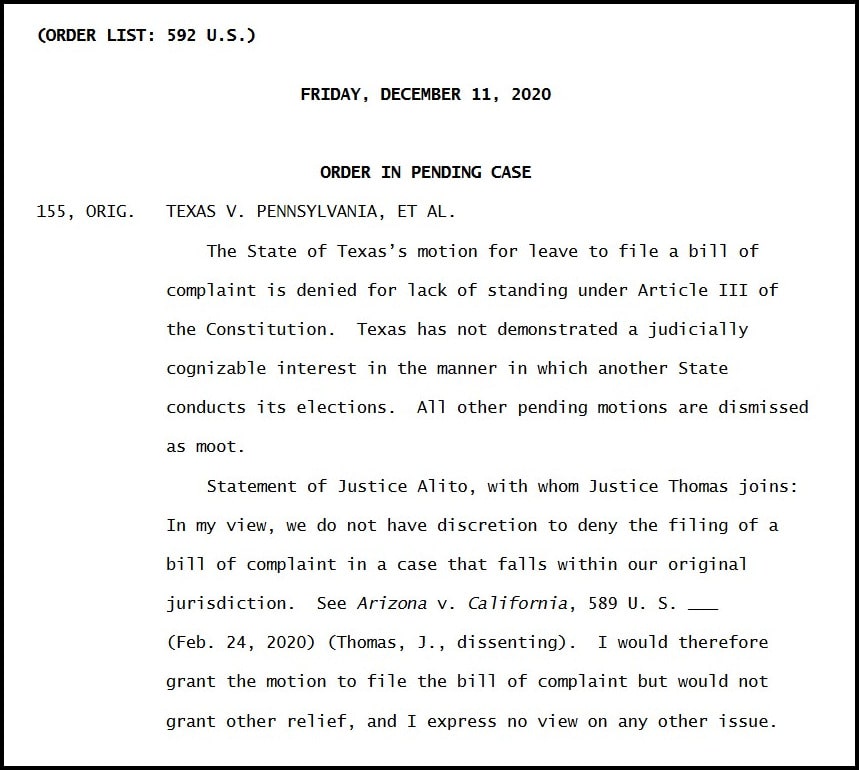
"In my view, we do not have discretion to deny the filing of a bill of complaint in a case that falls within our original jurisdiction." ~ Dissenting Statement by Justice Samuel Alito with Justice Clarence Thomas joining
If anything, the court has since shifted left with Biden's appointment of Justice Ketanji Brown Jackson to replace Justice Stephen Breyer. So to believe SCOTUS is going to step in with no constitutional authority—when they refused then—where they had the absolute obligation to do so to provide a remedy for the 2020 election makes no sense. It's a pipe dream.
There is No Magic Bullet
As we stated in the beginning, our purpose for writing this column isn't to dampen your spirits, rob you of hope, or "black pill" you. And it's certainly not to enrich ourselves or to add to a following. As Beanz commented in her Telegram voice memo thread:
"I know there's a lot of people going bonkers crazy over this thing. And they get very mad at you when you point out these deficiencies, but they exist... Don't kill the messenger just because I'm pointing this stuff out. I'm blown away about how angry people get. It's going to be disappointing. And I don't know whether people are willfully misinforming you, or misinforming you because they're just as hopeful as everyone else and don't understand the background." ~ Tracy Beanz on Telegram
If that were our goal, trust us, we would run with this story as many other—normally reliable—news sources have. The volume of emails, texts, messages, and posts asking us to cover this case in detail has been unreal. And the reaction to everything that isn't utter praise for the lawsuit has been nothing less than vicious. But UncoverDC's motto is "Actual Journalism," and the truth is the truth.
This story is "clickbait" gold and has caught fire on social media and among the America First base like few other stories we've seen, but it seems to be falling into a pattern we've kept seeing over the last few years. There's always a "plan" or a "miracle case" for which we all keep waiting. Some magic bullet or savior that will come in and save us all without us having to do much ourselves.
There is no magic bullet. Nobody is coming to save us. We got into the position as a country we're in today, frankly, out of complacency—and it happened over a long period of time. We were given warnings from history, and we ignored them or assumed "somebody else is keeping an eye on that."
We've talked a lot about the Constitution in this column. The Founders warned us what would happen if we allowed the government to get too powerful and our liberties to erode. If the separation of powers began to fade, or control to be concentrated in the hands of just a few—tyranny.

There's only one road back, and that's for each America First patriot to work as hard and relentlessly to build back the Republic as those who have worked to try to tear it down. They didn't do it overnight. It's going to take time—a long time—with setbacks along the way. And once we're back—and make no mistake, we will get back—we will have to struggle relentlessly to ensure it never happens again. Because the forces who hate this country and want to see her destroyed aren't going anywhere.
And always remember, we are still that Shining City Upon A Hill. The greatest nation on Earth and the hope of all mankind.
It's time to go fight for her... peacefully and patriotically.
*(Editor's Note (02/16/2023): This citation has been updated. Was originally incorrectly citing Article I Section IV; i.e. the "Elections Clause". Updated to correctly cite Article II Section I; i.e. the "Electors Clause".)


